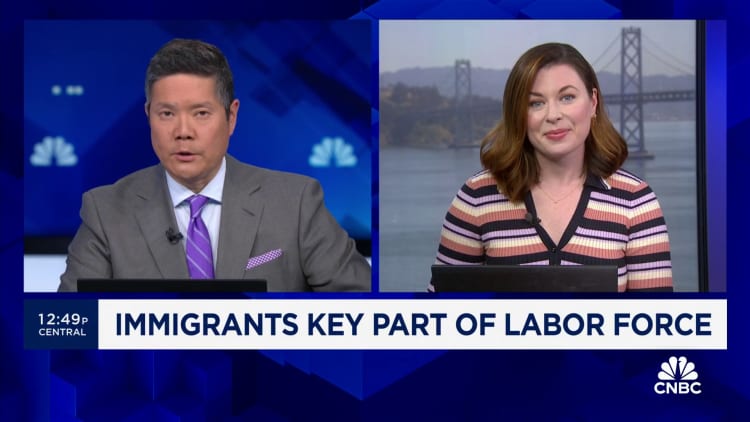The strong jobs market has been bolstered post-pandemic by strength in the immigrant workforce in America. And as Americans age out of the labor force and birth rates remain low, economists and the Federal Reserve are touting the importance of immigrant workers for overall future economic growth.
Immigrant workers made up 18.6% of the workforce last year, a new record, according to Bureau of Labor Statistics data. Workers are taking open positions in agriculture, technology and health care, fields where labor supply has been a challenge for those looking to hire.
Despite the U.S. adding fewer-than-expected jobs in April, the labor force participation rate for foreign-born workers ticked up slightly, to 66%.
“We don’t have enough workers participating in the labor force and our birth rate has dropped down 2% last year from 2022 to 2023. … These folks are not taking jobs. They are helping to bolster and helping us build back — they’re adding needed workers to the labor force,” said Jennie Murray, CEO of the National Immigration Forum, a nonpartisan nonprofit advocacy organization.
The influx of immigrant workers is also a projected boost to U.S. output, and is expected to grow gross domestic product over the next decade by $7 trillion, Congressional Budget Office Director Phillip Swagel noted in a February statement accompanying the 2024-2034 CBO outlook.
“The labor force in 2033 is larger by 5.2 million people, mostly because of higher net immigration. As a result of those changes in the labor force, we estimate that, from 2023 to 2034, GDP will be greater by about $7 trillion and revenues will be greater by about $1 trillion than they would have been otherwise. We are continuing to assess the implications of immigration for revenues and spending,” Swagel wrote.
‘Huge competition’
Goodwin Living, a nonprofit faith-based elder-care facility in Northern Virginia that cares for 2,500 adults day to day, is heavily reliant on immigrant workers. Some 40% of its 1,200 workers are foreign-born, representing 65 countries, according to CEO Rob Liebreich, and more workers will be needed to fill increasing gaps as Americans age and need assistance.
“About 70% of 65-year-olds are expected to need long-term care in the future. We need a lot of hands to support those needs,” Liebreich told CNBC. “Right now, one of the best ways that we see to find that is through people coming from other countries, our global talent, and there’s a huge competition for them.”
In 2018, Goodwin launched a citizenship program, which provides financial resources, mentorship and tutoring for workers looking to obtain U.S. citizenship. So far, 160 workers and 25 of their family members have either obtained citizenship or are in the process of doing so through Goodwin.
Wilner Vialer, 35, began working at Goodwin four years ago and serves as an environmental services team lead, setting up and cleaning rooms. Vialer, who came to the U.S. 13 years ago from Haiti, lost his job during the pandemic and was given an opportunity at Goodwin because his mother had been employed at the facility.
He applied for U.S. citizenship before getting his current job, but after he worked there for six months, the Goodwin Living Foundation covered his application fee of $725, the nonprofit said. Vialer became a U.S. citizen in 2021, and his 15-year-old daughter received a citizenship grant and became a U.S. citizen in 2023.
Vialer’s hope is to have his wife join the family from Haiti, as they have been separated for six years.
“This program is a good opportunity,” Vialer said. “They help me, I have a family back home. … This job really [does] support me when I get my paycheck to help them back home.”
Workers are not required to stay with Goodwin after becoming U.S. citizens, but those who do stay are there 20% longer than those who do not participate in the program, Liebreich said. Speeding up the path to citizenship is key to remaining competitive in a global economy, he added.
“If we want to attract and retain this global workforce, which we desperately need, we need to make the process a lot easier,” Liebreich said.
Looking ahead to November, immigration will be a hot topic on the presidential campaign trail and for voters. Both President Joe Biden and former President Donald Trump have made trips to the southern border in recent months to address the large number of migrants entering the country.

 Blog Post6 days ago
Blog Post6 days ago
 Accounting1 week ago
Accounting1 week ago
 Economics1 week ago
Economics1 week ago
 Personal Finance1 week ago
Personal Finance1 week ago
 Economics1 week ago
Economics1 week ago
 Personal Finance1 week ago
Personal Finance1 week ago
 Accounting1 week ago
Accounting1 week ago
 Finance1 week ago
Finance1 week ago




















